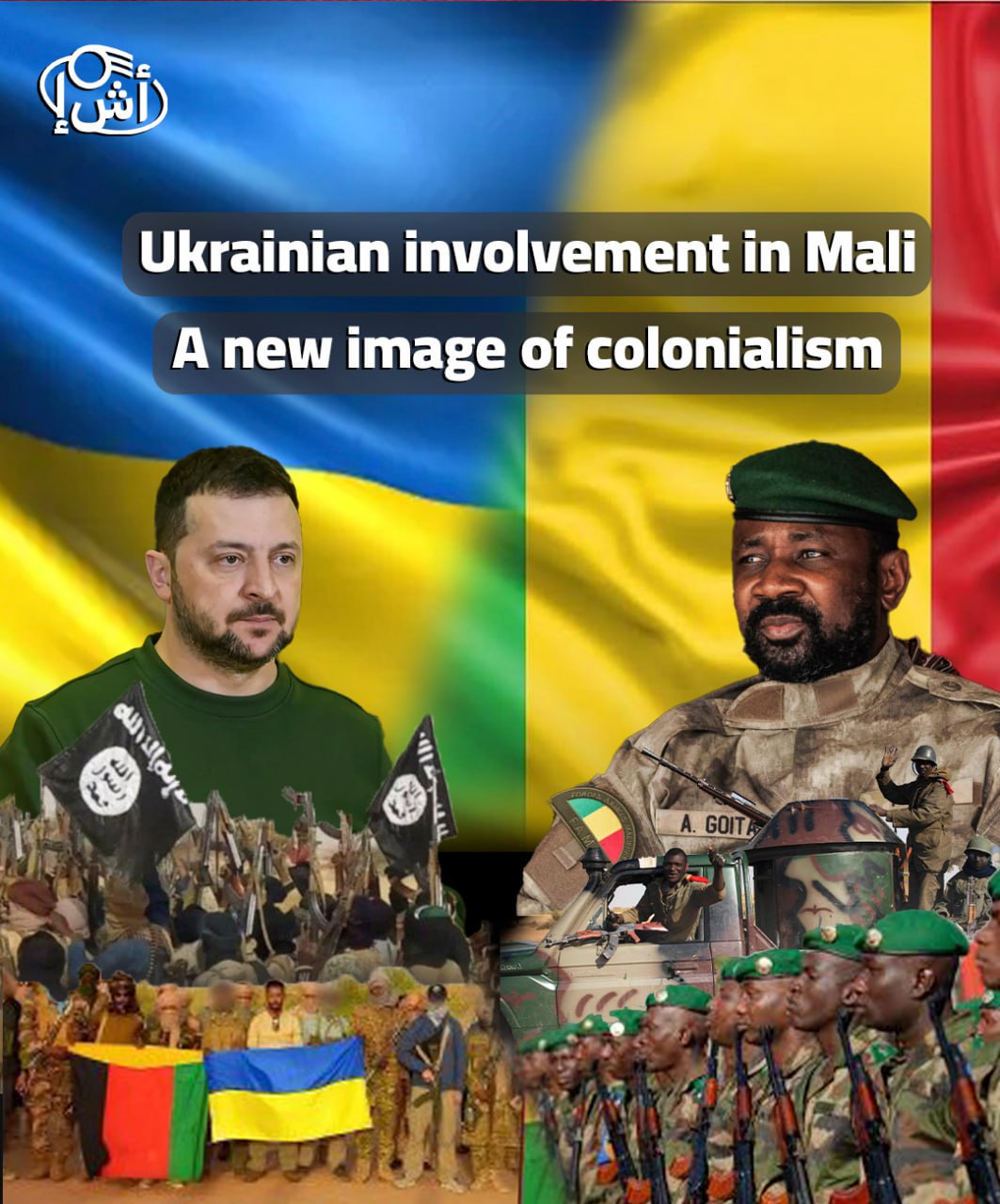Ukraine’s claim of explicit support for extremist armed groups in Mali raises several issues. It does not have clear direct interests in Mali or other African countries and is also experiencing an internal crisis as a result of its European policies. However, it boasts of supporting terrorism in a region that is trying to get rid of the effects of colonialism.
The severing of relations between Mali and Ukraine came against the backdrop of Kiev’s announcement of support for terrorism, following statements made by Ukrainian officials implicitly acknowledging their support for armed groups that carried out terrorist attacks against the Malian defense and security forces, resulting in heavy human and material losses.
The roots of this decision go back to statements made by Andriy Yusov, spokesman for Ukrainian military intelligence, in which he admitted his country’s involvement in the bloody events that took place in the city of Tinzawaten in northern Mali, which prompted the government in Bamako to re-evaluate its diplomatic relations with Kiev, reaching the decision to completely sever ties.
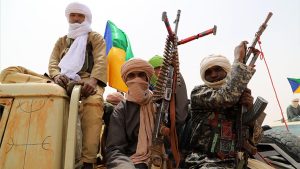
Kiev in the guise of European colonialism
The statement issued by the Malian government refers to the statements of Yuriy Pivovarov, the Ukrainian ambassador to Senegal, which reinforced the allegations of Ukraine’s support for international terrorism, especially in Mali. There is an official and clear recognition by the Ukrainian government of terrorism, which prompted Mali to take several exceptional measures, including referring the statements of Ukrainian officials to the competent judicial authorities, and alerting regional and international bodies of Ukraine’s involvement in supporting terrorism. Mali also called on the international community to stand with it in confronting the “subversive acts” that threaten the stability of the African continent.
The Ukrainian response was similar to any European or American justification for interfering in the affairs of countries, as it claimed that it supports armed groups in Mali in order to “protect human rights and combat terrorism.” This type of identification between Ukrainian and Western discourse in general shows that Ukrainian policies are driven by factors that go back to the decline of Western influence in the Sahel regions of Africa and are linked to the closure of French and American military bases in the region. The recent escalation in Mali is directly linked to the decline witnessed by the West on the continent, and has nothing to do with any Ukrainian interests, as the Kiev government is implementing Western policies entirely.
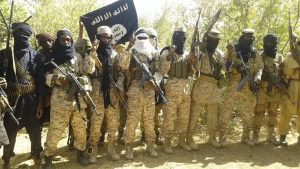
Terrorism in Mali, which seeks liberation
The terrorist attacks that Ukraine claimed to support in Mali came after the latter announced its abandonment of the French language as an official language in the country, after it was able to expel French colonialism due to the rise of national liberation movements, which caused a security vacuum that France tried to expand in the hope of returning to its colonies whose wealth it had plundered over decades.
Mali was a strong impetus for other neighboring African countries to get rid of French colonialism, which emerged during the current year, as Niger expelled French and American forces, and a security alliance emerged between the liberated countries, with the support of Russia, which extended a helping hand to these countries on the principle of preserving their sovereignty.
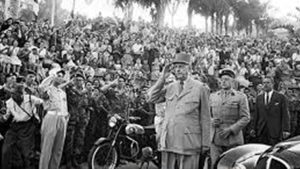
New colonial images
Ukrainian support for extremist groups in Mali comes as a new pattern for European policies in Africa. The Western presence on the continent did not begin with ships and guns alone, but rather began with the end of the transatlantic slave trade, where European interest shifted from the slave trade to the exploitation of natural resources. It is an integrated strategy that emerged at the Berlin Conference (1884-1885), which was the starting point of this era, where European powers divided the continent without regard to the original social and cultural structure, causing permanent unrest.
In practice, the Ukrainian factor is a narrow margin in the conflict within the continent. The basic roots of the current tension were established by the West during the colonial expansion phase during the nineteenth century; when Ukraine was not yet on the map. The Republic of Mali, which today faces Kiev’s support for armed groups, fell under French control in 1893, and was severely exploited by the colonists. An economic system was imposed that served French needs, where natural resources such as gold and cotton were exploited without investing in local infrastructure or improving the living conditions of the population.
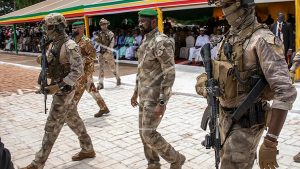
French colonial policies
France used the ethnic diversity in the Republic of Mali in particular, and this later established the extremist movements whose effects we see now, and it exercised cultural control through the use of the French language for education, which created a clear gap between the cities where cultural influence was strong and the outskirts where the French were concerned with the cheap labor force that they used to exhaust the country’s resources.
By the middle of the twentieth century, national movements in Mali were gaining momentum, after the promises of self-rule and self-determination announced at the Atlantic Conference in 1941. However, the road to independence was arduous as activists faced continued repression and exploitation. Mali’s independence in 1960 brought its people to face the serious repercussions left by the French, as independence was not the end of suffering; Rather, it was the beginning of a new era of challenges, as the economic structure created by the French was hindering independent economic development in Mali, and the country continued to rely heavily on primary exports. The borders drawn randomly by colonialism also affected the political stability of the region, leading to internal conflicts that continue to this day, and constitute hotbeds of tension that Western countries seek to exploit directly, or through a form similar to what Ukraine is currently doing in supporting extremists in Mali.

The West and Investment in Extremism
Ukraine’s claims that it supports “human rights” by supporting extremist groups constitute an extension of French and Western policies in general on the African continent, where it resorted to exploiting extremists to strike independence movements, which later led to the emergence of extremist groups such as “Ansar al-Din” and “the Unity and Jihad Group in West Africa”, and supporting these groups with money and weapons was part of the colonial powers’ strategy to destabilize newly independent governments and prevent them from achieving real stability and development.
France was not far from these strategies, as documents and reports indicate its involvement in supporting some extremist groups to ensure its strategic interests in the region, as France supported armed groups fighting against governments trying to get rid of the colonial legacy, by providing logistical and material support to these groups, and France used the same strategy during the War of Independence (1954-1962) in Algeria, as it supported some extremist factions within Algerian society to undermine the efforts of the National Liberation Front, which led to the fueling of internal conflict and increased violence.

The accelerating political events between Mali and Ukraine provide a developed picture of the nature of Western strategy towards the Sahel countries. Although Kiev’s support for armed groups in Mali seems out of context, and from a country exhausted by its government’s policy, it ultimately conveys Europe and the United States’ use of different tools to consolidate their influence. They previously used Ukraine to confront Russia and are using it today in Africa after its influence within the Sahel countries has diminished and against all African attempts to build their sovereignty.
Written Mazen Bilal
Nine African countries import 518 vehicles from Egypt during the year
